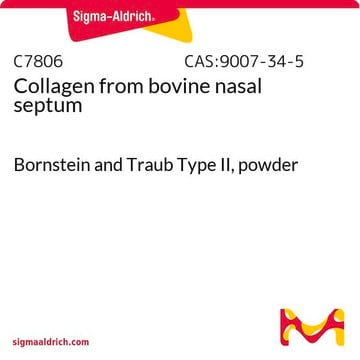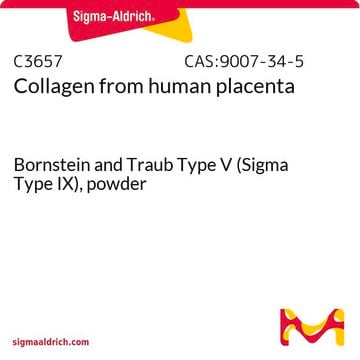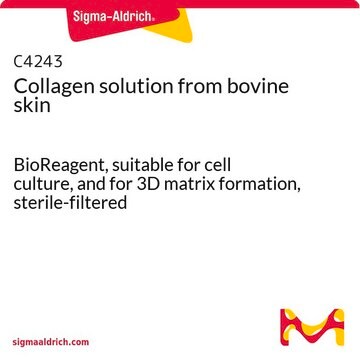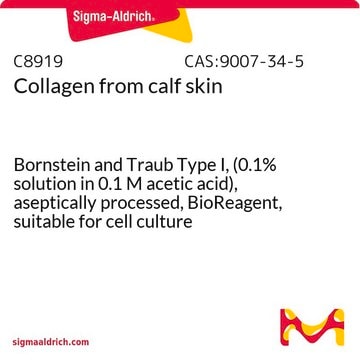C1188
Bovine Collagen Type II
from bovine tracheal cartilage, powder
Sign Into View Organizational & Contract Pricing
All Photos(1)
About This Item
Recommended Products
product name
Collagen from bovine tracheal cartilage, Bornstein and Traub Type II, powder
biological source
bovine cartilage (tracheal)
form
powder
solubility
aqueous acid: soluble
UniProt accession no.
storage temp.
2-8°C
Gene Information
cow ... COL2A1(407142)
General description
Collagen protein is abundantly present in human. It is the prime structural constituent of dermis. It is also an important constituent of extracellular matrix (ECM).
Collagen is classified into a number of structurally and genetically distinct types. We use the nomenclature proposed by Bornstein and Traub. Do not confuse Sigma type designations with recognized collagen classification types.
Application
Collagen from bovine tracheal cartilage has been used to induce arthritis in male DBA/1 mice. It has also been used as a fluorophore to acquire fluorescence emission spectra on the reflectance and fluorescence lifetime spectrometer (RFLS).
Collagen-type II has been investigated for its importance in haemostasis. Two peptides, CB8 and CB11, are sites of platelet binding and activation on collagen-type II. Collagen-type II has also been used as a model for arthritis in animals, where FR140423, a selective cyclooxygenase (COX)-2 inhibitor, has shown an anti-inflammatory effect without gastric lesions that may occur with treatment via indomethacin.
Collagen Type II is sometimes used to induce an animal model of rheumatoid arthritis. However, under conditions leading to formation of reactive oxygen species, the subjects develop tolerance for auto-antibodies. This is an unusual situation of ROS having a favorable effect.
Collagen Type II is sometimes used to induce an animal model of rheumatoid arthritis. However, under conditions leading to formation of reactive oxygen species, the subjects develop tolerance for auto-antibodies. This is an unusual situation of ROS having a favorable effect.
Biochem/physiol Actions
Collagen participates in the aging process. It offers a structural framework for cells and mechanical strength to tissues.
Preparation Note
Prepared by a modification of the pepsin extraction procedure of Trentham, et al., J. Exp. Med., 146, 857 (1977).
Storage Class Code
11 - Combustible Solids
WGK
WGK 1
Flash Point(F)
Not applicable
Flash Point(C)
Not applicable
Personal Protective Equipment
dust mask type N95 (US), Eyeshields, Gloves
Certificates of Analysis (COA)
Search for Certificates of Analysis (COA) by entering the products Lot/Batch Number. Lot and Batch Numbers can be found on a product’s label following the words ‘Lot’ or ‘Batch’.
Already Own This Product?
Find documentation for the products that you have recently purchased in the Document Library.
Customers Also Viewed
Molecular and cellular basis of hypertrophic scarring
Total Burn Care, 495-505 (2012)
Quantitative molecular sensing in biological tissues: an approach to non-invasive optical characterization
Chandra M, et al.
Optics Express, 14(13), 6157-6171 (2006)
Important role of interleukin-3 in the early phase of collagen-induced arthritis
Bruhl H, et al.
Arthritis and Rheumatism, 60(5), 1352-1361 (2009)
Aging and the skin
Brocklehurst's Textbook of Geriatric Medicine and Gerontology, 133-137 (2010)
Rosalia Cuahtecontzi Delint et al.
Biomaterials, 276, 120996-120996 (2021-07-20)
One of the major challenges within the emerging field of injectable stem cell therapies for articular cartilage (AC) repair is the retention of sufficient viable cell numbers at the site of injury. Even when delivered via intra-articular injection, the number
Our team of scientists has experience in all areas of research including Life Science, Material Science, Chemical Synthesis, Chromatography, Analytical and many others.
Contact Technical Service
